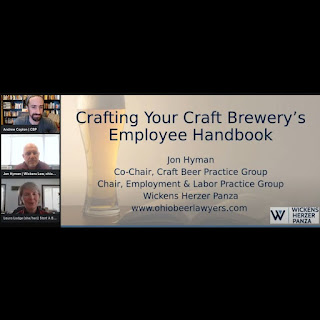Friday, February 24, 2023
WIRTW #662: the “platform” edition
For more information, contact Jon at (440) 695-8044 or JHyman@Wickenslaw.com.
Do you like what you read? Receive updates two different ways:
Subscribe to the feed or register for free email updates.
Thursday, February 23, 2023
NLRB bans non-disparagement and confidentiality covenants in severance agreements. What now?
Is it time to rip up your stock severance agreement? Consider the following two clauses, which I bet your standard agreement contains in some form.
For more information, contact Jon at (440) 695-8044 or JHyman@Wickenslaw.com.
Do you like what you read? Receive updates two different ways:
Subscribe to the feed or register for free email updates.
Wednesday, February 22, 2023
Do you know what to do if employees strike?
Labor strikes by employees were up a shocking 52 percent in 2022 as compared to 2021. That's according to Cornell-ILR Labor Action Tracker Annual Report. Employee collective work stoppages are on the rise, and there is no indication of them abating any time soon.
Do you know what to do if your employees walk off the job? Here are 10 dos and don'ts.
For more information, contact Jon at (440) 695-8044 or JHyman@Wickenslaw.com.
Do you like what you read? Receive updates two different ways:
Subscribe to the feed or register for free email updates.
Tuesday, February 21, 2023
The 1st nominee for the “Worst Employer of 2023” is … the foul-mouthed retaliator
"I'm going to fire all the motherf---ers!"
That's the threat Department of Labor accused Tamesha Porter, the sole owner and operator of Safe Haven Assisted Living of Haslett, of making to her employees after the Department of Labor started investigating its wage and hour practices.
For more information, contact Jon at (440) 695-8044 or JHyman@Wickenslaw.com.
Do you like what you read? Receive updates two different ways:
Subscribe to the feed or register for free email updates.
Friday, February 17, 2023
WIRTW #661: the “crafty” edition
Earlier this week I had the pleasure of presenting, Crafting Your Craft Brewery's Employee Handbook, a webinar jointly sponsored by Craft Beer Professionals and Start A Brewery. (Thank you, Andrew Coplon and Laura Lodge, for asking me to present 🍻)
In 60 minutes, I discussed why every business needs an employee handbook and ran through every policy a craft brewery needs in its handbook. While the presentation is craft brewery focused, any business of any size will find most of the information applicable. I guarantee you'll learn something.
You can watch the entire webinar here.
Here's what I read this past week that you should read, too.
For more information, contact Jon at (440) 695-8044 or JHyman@Wickenslaw.com.
Do you like what you read? Receive updates two different ways:
Subscribe to the feed or register for free email updates.
Thursday, February 16, 2023
Do you know the rules for paying remote workers for “downtime”?
Every 10 minutes at some random point that she couldn't anticipate, the company took photos of her and her work, a screenshot of whatever she was working on, and a photo of her face. And they were doing that to verify whether or not she was working.… The company was using that to pay Carol and the other workers only for the minutes when they appeared active.
If she was clicking away at a spreadsheet, doing demonstrable work, she was fine. She would be paid for that 10-minute increment. But as soon as she got a cup of coffee or answered the doorbell or went to the bathroom, she risked not being paid for that time.…
[E]ven if she had worked for 9 and 1/2 minutes out of 10 minutes, if that screenshot showed her inactive, if she was gone or distracted for that 30 seconds, she wouldn't be paid for that increment.
The Department of Labor just issued a Field Assistance Bulletin reminding employers on the proper payment of remote workers under the Fair Labor Standards Act.
- The FLSA requires employers to pay nonexempt employees for all hours worked.
- "Hours worked" is not limited solely to time spent on active productive labor but also includes time spent waiting or on break.
- Short breaks of 20 minutes or less (e.g., to go to the bathroom, get a cup of coffee, let the dog outside, or stretch one's legs) are generally counted as compensable hours worked.
- Longer breaks "during which an employee is completely relieved from duty, and which are long enough to enable [the employee] to use the time effectively for [their] own purposes are not hours worked."
- These rules apply regardless of whether the work is performed at the employer's worksite, at the employee's home, or at some other location away from the employer's worksite.
In other words, even if you catch your nonexempt employees "not working" during the workday, if a break lasts 20 minutes or less you still must pay them. It's non-negotiable under the FLSA. (Exempt employees are paid a salary which becomes owed in full as soon as he or she works just one minute in a work week.)
If you discover an employee abusing paid breaks or their salary status, your remedy is discipline or termination, not withholding wages.
For more information, contact Jon at (440) 695-8044 or JHyman@Wickenslaw.com.
Do you like what you read? Receive updates two different ways:
Subscribe to the feed or register for free email updates.
Wednesday, February 15, 2023
No privacy for drug-test pees
Someone on Reddit asks: Is it legal for my new employer to watch my pee for a drug test?
I can’t speak for every state, but in my state the answer is an unequivocal “yes.” It’s perfectly legal to require the direct observation of an employee peeing for a new hire or workplace drug test.
For more information, contact Jon at (440) 695-8044 or JHyman@Wickenslaw.com.
Do you like what you read? Receive updates two different ways:
Subscribe to the feed or register for free email updates.







